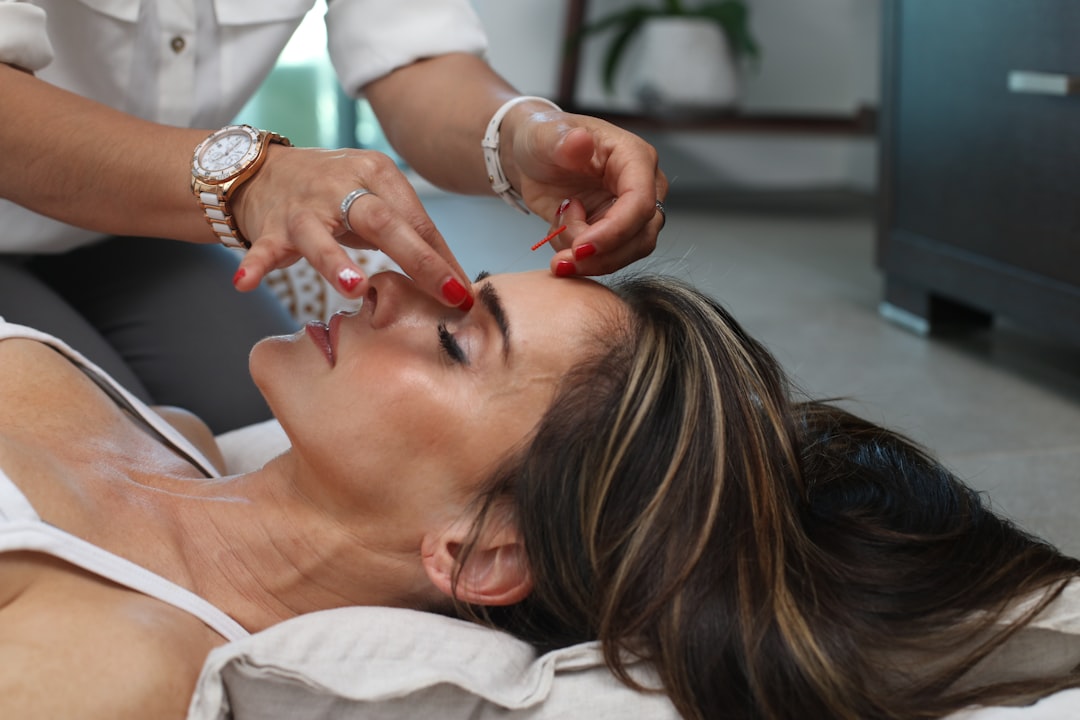Understanding your skin type is crucial when it comes to choosing the right moisturizer for your skin. There are generally four main skin types: normal, dry, oily, and combination. Normal skin is well-balanced, not too oily or too dry, with small pores and few imperfections. Dry skin often feels tight and may appear flaky, especially in colder weather. Oily skin is characterized by excess sebum production, enlarged pores, and a tendency to develop acne. Combination skin is a mix of both oily and dry areas, with the T-zone (forehead, nose, and chin) being oily and the cheeks being dry.
It’s important to identify your skin type before selecting a moisturizer as different formulations are designed to address specific skin concerns. For example, if you have oily skin, you’ll want to look for a lightweight, oil-free moisturizer that won’t clog your pores. On the other hand, if you have dry skin, you’ll need a richer, more hydrating formula to replenish moisture and prevent flakiness. Understanding your skin type will help you narrow down your options and find a moisturizer that suits your specific needs.
Summary
- Understanding your skin type is crucial for choosing the right moisturizer
- Identifying your skin concerns will help you select a targeted moisturizer
- Look for ingredients like hyaluronic acid and ceramides in a moisturizer for hydration and repair
- Choose the right texture for your skin, such as lightweight for oily skin and rich for dry skin
- Consider environmental factors like pollution and UV exposure when selecting a moisturizer
- There are budget-friendly moisturizer options available for every skin type
- Consultation with a dermatologist can provide personalised recommendations for your skin’s needs
Identifying Your Skin Concerns
In addition to understanding your skin type, it’s important to identify any specific skin concerns you may have. These concerns can range from acne and fine lines to hyperpigmentation and sensitivity. By pinpointing your individual skin concerns, you can look for moisturizers that contain targeted ingredients to address these issues. For example, if you have acne-prone skin, you may want to choose a moisturizer with salicylic acid or benzoyl peroxide to help control breakouts. If anti-aging is your main concern, look for moisturizers with ingredients like retinol, hyaluronic acid, or peptides to help reduce the appearance of fine lines and wrinkles.
By identifying your skin concerns, you can tailor your moisturizer choice to better meet your needs. This targeted approach can help you achieve better results and improve the overall health and appearance of your skin. Whether you’re dealing with acne, dryness, or signs of aging, there are moisturizers available with specific ingredients to help address these issues.
Ingredients to Look for in a Moisturizer
When choosing a moisturizer, it’s important to pay attention to the ingredients list. Certain key ingredients can make a significant difference in how well a moisturizer performs for your skin. For example, hyaluronic acid is a powerful humectant that attracts and retains moisture in the skin, making it an excellent choice for those with dry or dehydrated skin. Another beneficial ingredient is glycerin, which helps to maintain the skin’s moisture balance and prevent dryness.
For those with sensitive or irritated skin, ingredients like aloe vera and chamomile can help soothe and calm the skin. Antioxidants such as vitamin C and E can help protect the skin from environmental damage and promote a more youthful complexion. Additionally, niacinamide is a versatile ingredient that can help improve the appearance of enlarged pores, uneven skin tone, and fine lines.
It’s also important to be mindful of any potential allergens or irritants in the ingredients list, especially if you have sensitive skin. Fragrances and certain preservatives can cause irritation for some individuals, so opting for fragrance-free or hypoallergenic formulas may be beneficial.
Choosing the Right Texture for Your Skin
The texture of a moisturizer plays a significant role in how it feels on the skin and how well it performs for different skin types. For example, those with oily or acne-prone skin may prefer lightweight, gel-based moisturizers that absorb quickly and don’t leave a greasy residue. On the other hand, individuals with dry or mature skin may benefit from richer, creamier textures that provide intense hydration and nourishment.
In addition to traditional creams and gels, there are also moisturizing serums and lotions available. Serums are lightweight and fast-absorbing, making them ideal for layering under other skincare products or makeup. Lotions are thinner in consistency compared to creams and can be a good option for those with normal to combination skin.
Ultimately, the right texture for your skin will depend on your individual preferences and needs. Some people may prefer a lightweight feel, while others may enjoy the comfort of a more substantial cream. Experimenting with different textures can help you determine what works best for your skin type and concerns.
Considering Environmental Factors
Environmental factors can have a significant impact on the condition of your skin, so it’s important to consider these when choosing a moisturizer. For example, if you live in a dry climate or spend a lot of time in air-conditioned environments, you may need a more emollient moisturizer to combat moisture loss. Conversely, if you live in a humid climate, you may prefer a lighter formula that won’t feel heavy on the skin.
Additionally, environmental stressors such as pollution and UV radiation can contribute to premature aging and skin damage. In these cases, choosing a moisturizer with added antioxidants and SPF can help protect the skin from these external aggressors. Antioxidants like vitamin C and E can neutralize free radicals and reduce oxidative stress on the skin, while SPF helps shield against harmful UV rays.
By taking into account environmental factors, you can select a moisturizer that not only addresses your specific skin concerns but also provides protection against external elements that could compromise the health and appearance of your skin.
Budget-Friendly Options

Skincare doesn’t have to break the bank, and there are plenty of budget-friendly moisturizer options available that deliver great results. Many drugstore brands offer quality moisturizers at affordable prices, making it easier to maintain a consistent skincare routine without overspending. Look for products that contain beneficial ingredients like hyaluronic acid, glycerin, and niacinamide to ensure that you’re getting good value for your money.
Another cost-effective option is to look for multipurpose products that offer additional benefits alongside basic hydration. For example, some moisturizers also contain SPF for sun protection or anti-aging ingredients like retinol or peptides. By choosing these multi-tasking products, you can streamline your skincare routine and save money on purchasing separate treatments.
It’s also worth keeping an eye out for sales, promotions, and loyalty programs offered by skincare retailers. Stocking up on your favourite moisturizer when it’s on sale or taking advantage of loyalty rewards can help you save money in the long run while still maintaining healthy, well-nourished skin.
Consultation with a Dermatologist
While there are many resources available for understanding your skin type and selecting the right moisturizer, consulting with a dermatologist can provide valuable insight tailored specifically to your individual needs. A dermatologist can assess your skin type, identify any underlying issues or concerns, and recommend suitable products based on their professional expertise.
In some cases, individuals may have specific skin conditions such as eczema, rosacea, or severe acne that require specialised care. A dermatologist can provide personalised recommendations for managing these conditions and preventing further irritation or flare-ups.
Furthermore, if you’re unsure about which ingredients or formulations are best for your skin type and concerns, a dermatologist can offer guidance based on their knowledge of skincare science and clinical experience. This can help you make more informed decisions when choosing a moisturizer and other skincare products.
In conclusion, understanding your skin type and concerns is essential for selecting the right moisturizer that will effectively nourish and protect your skin. By paying attention to ingredients, texture, environmental factors, budget-friendly options, and seeking professional advice when needed, you can ensure that your skincare routine is tailored to meet your specific needs for healthy, radiant-looking skin.
Discover the power of niacinamide and its skin-boosting benefits in our related article. Niacinamide is a versatile ingredient that can help improve the overall health and appearance of your skin. Learn more about its potential benefits and how to incorporate it into your skincare routine. Read more about the wonders of niacinamide and unlock the secrets to healthier, more radiant skin.
FAQs
What is the importance of using a moisturizer for your skin?
Using a moisturizer helps to keep the skin hydrated, prevents dryness, and can improve the skin’s overall texture and appearance. It also helps to create a protective barrier on the skin, which can prevent environmental damage and signs of aging.
How do I choose the right moisturizer for my skin type?
It’s important to consider your skin type when choosing a moisturizer. For oily skin, look for oil-free or non-comedogenic formulas. For dry skin, opt for a richer, more hydrating moisturizer. Combination skin may benefit from a lightweight, hydrating formula. Those with sensitive skin should choose a moisturizer that is fragrance-free and hypoallergenic.
What ingredients should I look for in a moisturizer?
Look for moisturizers that contain ingredients such as hyaluronic acid, glycerin, ceramides, and dimethicone, which are known for their hydrating and skin-barrier repairing properties. For anti-aging benefits, consider moisturizers with retinol, peptides, or antioxidants like vitamin C and E.
How often should I apply moisturizer?
It’s recommended to apply moisturizer at least twice a day, in the morning and evening, after cleansing and toning your skin. You may need to apply more frequently if your skin feels dry or tight throughout the day.
Can I use the same moisturizer for my face and body?
While some moisturizers are formulated for both face and body use, it’s generally best to use a separate moisturizer for your face and body. Facial skin is more delicate and may have different needs compared to the skin on the rest of your body.




